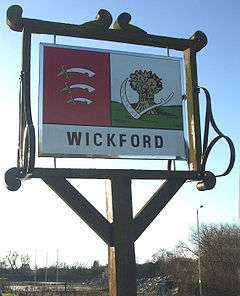Robert Wikeford
Robert Wikeford (1330–29 August 1390) was a distinguished English-born diplomat, lawyer and judge, who became Lord Chancellor of Ireland and Archbishop of Dublin.
Early career

He was born at Wickford in Essex, where his family are said to have been Lords of the Manor of Wickford.[1] He was a fellow of Merton College, Oxford. He became a clerk of Chancery, and was appointed Archdeacon of Winchester in 1368.[2]
He was clearly a man of considerable diplomatic and military ability, and was entrusted by King Edward III with a number of diplomatic missions to Count Louis II of Flanders, Joanna, Duchess of Brabant and King Peter IV of Aragon. In 1373 he was made Constable of Bordeaux and later joined with the Seneschal in the government of Aquitaine. The. King referred to Wikeford as "our beloved clerk".[3]
O'Flanagan[4] records that in 1375 the royal judges in Aquitaine, Sir Guy de Bryan and Edmund Mortimer, 3rd Earl of March, in a lawsuit brought by Ivo Beausteau against Wikeford, gave judgement against him without hearing him in his own defence and imposed financial penalties of great severity on him. Wikeford appealed to the King in Council, and the King immediately ordered the judgement to be cancelled.[5] The episode suggests that Wikeford, though a valued Crown servant, was not popular.
He was also sued by another Royal clerk called Thomas who obtained judgment against him for £10 (a not inconsiderable sum in the fourteenth century) shortly before his translation to Dublin.[6] To Wikeford's embarrassment, Thomas was permitted to issue a writ to distrain any lands held by the Archbishop in Ireland in satisfaction of the judgment.[7]
Irish career
In 1375 Wickford became Archbishop of Dublin and a year later he was made Lord Chancellor of Ireland. O'Flanagan[8] believes (despite the lack of written records for this period) that he was a gifted and conscientious Chancellor; in addition to his judicial business he undertook a vast range of official duties, including the holding of a Parliament at Castledermot. He was granted the manor of Swords, near Dublin, and the right to hold a fair there. He ceased to be Chancellor about 1380, and as he aged his duties as Primate became increasingly onerous. In 1390 he was permitted to return to England in the hope of improving his health, but he died in England on 29 August.
Character
O'Flanagan praises him as a wise and learned judge and a man of great ability.[9] However, the summary judgment given against him in his Aquitainian lawsuit, without Wikeford being heard in his own defence, suggests that he was not popular. As Archbishop he showed the harsher side of his character by expelling all beggars from his diocese in 1376, despite protests that many of them, so far from being "idle vagabonds" had worked hard on the restoration of St. Patrick's Cathedral, Dublin in the time of Wikeford's predecessor Thomas Minot.[10]
References
- ↑ O'Flanagan, J. Roderick Lives of the Lord Chancellors of Ireland London 1870
- ↑ Ball, F. Elrington The Judges in Ireland 1221–1921 John Murray London 1926
- ↑ D'Alton, John "Memoirs of the Archbishops of Dublin" Dublin Hodges and Smith 1838
- ↑ Lives of the Chancellors
- ↑ D'Alton "Archbishops of Dublin"
- ↑ "Archbishops of Dublin"
- ↑ "Archbishops of Dublin"
- ↑ Lives of the Chancellors
- ↑ Lives of the Chancellors
- ↑ Archbishops of Dublin